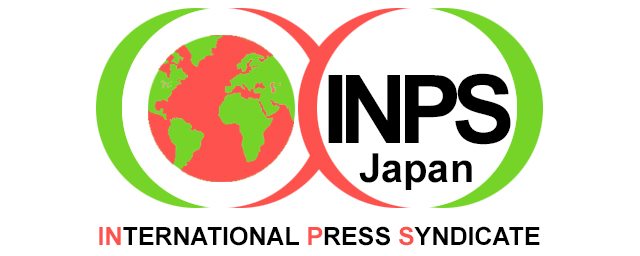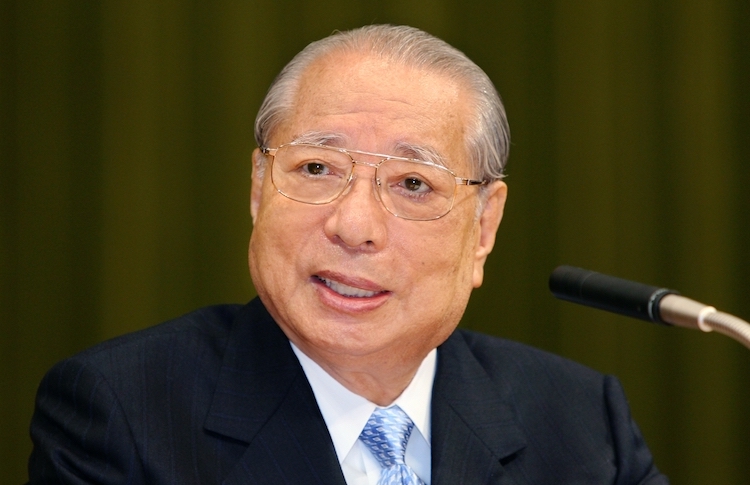By Ramesh Jaura
IDN-InDepth NewsAnalysis
BERLIN | TOKYO (IDN) – In a variation of the legendary slogan “make love, not war”, an eminent Buddhist philosopher is calling for a nuclear-free world in which genuine human security, sustainable development and unwavering respect for the dignity of life do not only comprise an ideal but constitute an entrenched reality.
In a 23-page ‘peace proposal,’ titled ‘Human Security and Sustainability: Sharing Reverence for the Dignity of Life,’ Buddhist leader Daisaku Ikeda pleads for a nuclear abolition summit in 2015 in Hiroshima and Nagasaki on the 70th anniversary of the atomic bombings of the two cities so that the growing momentum toward elimination of nuclear weapons becomes irreversible.
2015 will also be the year of the Nuclear Non-Proliferation Treaty (NPT) Review Conference, and Ikeda expects such a summit to bring home to world leaders the terrible destructive capacity of nuclear weapons and so help ensure the necessary action toward their abolition.
Along with nuclear weapons, natural disasters and environmental degradation as well as poverty “present future generations with threats and burdens that will only become greater the more we delay,” says Ikeda in his peace proposal, which is the thirtieth since1983 on January 26, the day that the Soka Gakkai International (SGI) was founded eight years earlier.
The 2012 peace proposal coincides with the fifty-fifth anniversary of the declaration issued by Ikeda’s mentor and second Soka Gakkai president Josei Toda (1900-1958) calling for the prohibition of nuclear weapons. This declaration had as its background the increasingly fierce competition among nuclear-weapon states to develop ever larger and more powerful nuclear weapons.
Toda stated, “Although a movement calling for a ban on the testing of nuclear weapons has arisen around the world, it is my wish to go further, to attack the problem at its root. I want to expose and rip out the claws that lie hidden in the very depths of such weapons.”
As an eminent global citizen and a staunch civil society protagonist Roberto Savio says, the SGI president’s peace proposal is “a fascinating document which joins vision with analysis, goals with reality, and strategy with knowledge.”
It comes at a point in time when international attention tends to focus on the forthcoming presidential elections in the U.S., Russia and France, and change in government in China but very little on an international conference on the Middle East in order to turn the region into a zone free of nuclear and other weapons of mass destruction. The launch of such a conference was decided at the May 3-28, 2010 NPT Review conference in New York.
The year that marked the launch of Ikeda’s first peace proposal, was characterised by nuclear deterrence which threatened to trigger what U.S. President Ronald Reagan termed ‘star wars’. These were packaged as “a long-term research and development program to begin to achieve our ultimate goal of eliminating the threat posed by strategic nuclear missiles” and “pave the way for arms control measures to eliminate the weapons themselves”.
Viewed from a benevolent perspective, Reagan’s approach came close to Machiavellian ‘the end justifies the means’ dictum. This kind of philosophy is however rejected by Ikeda who, inspired by his unrelenting commitment to the anti-nuclear movement since the late 1950s, has been campaigning for a nuclear weapons free world.
Good Prospects for NWC
“For years, the SGI has promoted a movement to manifest the will of the world’s people for the outlawing of nuclear weapons through the adoption of a Nuclear Weapons Convention (NWC). There are numerous signs that we are now positioned at a tipping point where a ‘cascade’ of governments start supporting adoption of an NWC,” writes Ikeda.
Encouraging signs in his view are:
– The civil society initiative to draft a model NWC in 1997 has been followed up by a revised draft issued in 2007, demonstrating that the process of reviewing the legal measures necessary to achieve the prohibition and abolition of nuclear weapons is well under way.
– Since 1996, Malaysia and other countries have annually proposed a UN General Assembly resolution calling for the start of negotiations on an NWC. Support for this resolution has continued to grow; last year (2011) 130 member states supported it, including China, India, Pakistan, North Korea and Iran.
– In 2008, UN Secretary-General Ban Ki-moon proposed negotiations on an NWC or a framework of separate, mutually reinforcing instruments.
– The 2010 NPT Review Conference noted this proposal in the final outcome document that it adopted with the unanimous consent of all participants.
– The Inter-Parliamentary Union (IPU), to which 159 countries, including Russia, Britain, France and China, belong, has also unanimously expressed its support for this proposal.
– Mayors for Peace, with a membership of more than 5,100 cities and municipalities around the world, is actively seeking the early start of negotiations toward an NWC. Likewise, the InterAction Council, a group composed of former heads of state and government, has called for the conclusion of an NWC.
– In September 2009, the UN Security Council held a special summit session in which it adopted Security Council Resolution 1887 pledging efforts to create the conditions for a world without nuclear weapons.
– The worsening budgetary situation in different countries as a result of the ongoing economic crisis has prompted a serious rethinking of military expenditures, including in nuclear-weapon states where the costs of these armaments are finally being debated.
While it is clear that none of these developments, in itself, represents a decisive breakthrough, Ikeda believes that collectively they constitute a consistent and irreversible momentum toward the goal of a world finally free of nuclear weapons.
“The leading role played by civil society in developing a draft Nuclear Weapons Convention and in actively seeking the start of negotiations through petition drives and other activities clearly demonstrates that the spiritual wellspring and normative source for such a treaty exist as a vital presence in the hearts and minds of the world’s ordinary citizens,” writes Ikeda.
“What is required now,” he adds, “is to take this living, breathing awareness – the determination that the tragedy wrought by nuclear weapons must never be repeated and that humanity and nuclear weapons cannot coexist – and give it concrete form as a binding legal agreement expressing the shared conscience of humankind.”
The SGI president pleads for initiating concrete negotiations that will culminate in the realization of an NWC, and says: One way to do this would be to present it as a basic treaty establishing the legal framework of a world without nuclear weapons with a set of associated protocols. The basic treaty would allow signatory states to clearly commit to the goal of a world without nuclear weapons and undertake a process of mutual threat reduction.
Separate protocols could enumerate prohibited activities such as development and production, use or threat of use, and establish procedures for decommissioning and verification. Ikeda urges “NGOs and forward-looking governments” to establish an action group to embark on this venture.
“We should set a target of 2015 for the release – or better yet, the signing – of an agreed-upon draft of the basic framework treaty.”
Human Rights and Sustainability
Along with nuclear abolition, Ikeda says: “Humanitarianism, human rights and sustainability need to be the core elements of a future vision.” Such a vision comprises:
“A world that, refusing to overlook human tragedy wherever it occurs, unites in solidarity to overcome threats;
“A world that, based on the empowerment of individuals, gives priority to securing the dignity and right of all people to live in peace;
“A world that, remembering the lessons of the past, does not allow unborn generations to inherit the negative legacies of human history and directs all its energies to transforming those legacies.”
For Ikeda, sustainable energy is also a key issue. Reflecting on the Fukushima nuclear disaster in March 2011, he urges Japan to make a rapid transition to energy policies not reliant on nuclear power generation, and to intensify its involvement in renewable energy technology and research, both at home and to support efforts in developing countries.
In this context, the SGI president proposes strengthening of the global role of the UN nuclear watchdog, the International Atomic Energy Agency (IAEA) in dealing with the impacts of nuclear power plant accidents and decommissioning obsolescent reactors.
Considering the suffering caused by an increasing prevalence of natural disasters around the world, Ikeda calls for responses to be focussed on a human rights approach and proposes that the mandate of the Office of the United Nations High Commissioner for Refugees (UNHCR) be officially expanded to include provision of relief for people displaced by such disasters.
He also stresses the importance of empowering women to play a greater role in disaster prevention, mitigation and recovery efforts. Ikeda writes: “Women bear a disproportionate burden of the deprivations resulting from disasters, and they are often exposed to grievous threats. At the same time, there is a need to afford greater recognition to women’s special capacities to contribute.
“Women must be empowered as effective change agents in the fields of disaster risk reduction, recovery and reconstruction, in line with similar recognition of their potential roles in conflict prevention, resolution and peacebuilding. Specifically, disaster risk reduction and recovery could be included in the scope of UN Security Council Resolution 1325, or a new resolution could be adopted with a focus on the roles women play in these areas.”
With an eye on the United Nations Conference on Sustainable Development – popularly known as Rio+20 – in June in the Brazilian city of Rio de Janeiro, the SGI president calls for a broader debate on the concept of Sustainable Development Goals (SDGs) to follow the Millennium Development Goals (MDGs) from 2015.
Ikeda writes: “A set of common goals for a sustainable future should inherit the spirit of the Millennium Development Goals of alleviating the distortions in our global society generated by poverty and income disparities, and should also address the full range of human security issues.” [IDN-InDepthNews – February 02, 2012]
2012 IDN-InDepthNews | Analysis That Matters
Picture: SGI President Daisaku Ikeda | Credit: daisakuikeda.org


